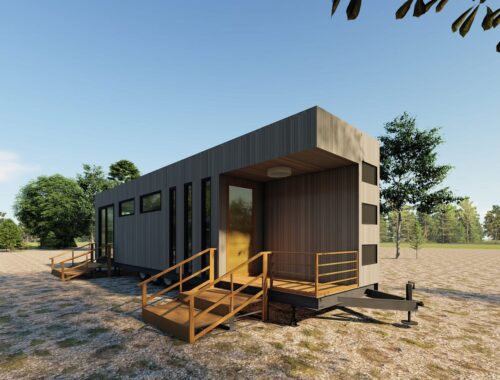The World’s Best Mountain Bike Race Takes Place in British Columbia
It doesn’t matter if you’ve ever raced before. Anyone who loves to mountain bike should take on this multiday adventure at least once.
The 2017 BC Bike Race has wrapped, and if the organization has learned anything in its 11 years, it’s how to run an outrageously entertaining and smooth event. Over seven days in mid-July, 600 riders took on 191 miles of northwoods trails, covering a huge arc across British Columbia that started in Vancouver and ended at the Whistler Mountain Bike Park. The race is kind of like the Tour de France in that it moves a massive entourage across a course and to a new location every single day. Given the wild, remote country and stellar singletrack that the race covers—and the logistics it takes to do everything seamlessly—the event is pretty much without equal in the world.
We registered a team to experience the race firsthand, and they came back raving. “I have done hundreds, if not thousands of races over the years, and this one really stands alone,” said Mike Raney, owner of Over the Edge Sedona, who completed the BC Bike Race for the first time. “You ride super hard every day, then hang out with friends, eat some great food, sleep, and repeat for a week. Everything is taken care of for you. All you have to think about is riding and enjoying.” It’s the ultimate riding vacation through some of the world’s finest terrain, an endeavor that every mountain biker should take on at least once in their lives. Raney says he’s already dreaming of a return. Here’s why.
#1. It’s Hard
The BC Bike Race might make for a great riding vacation, but expect more riding than vacation. Ride times ranged from two to four hours a day, which is deceptively short. The courses aren’t especially long—day three was the biggest, at 35.5 miles—but the combination of high mountain terrain, incessant climbing and descending, lots of technical bits, and seven straight days of pedaling will leave you tired. This is not the event to choose for building fitness or simply having a nice cruise. Having said that, if you complete it (which most do, incidentally), you’ll ride away feeling like a beast.
#2. The Trails Are Epic
Many of the multiday mountain bike stage races out there pass through beautiful country, but they do it mostly on forest roads and two-tracks. During the BC Bike Race, about 75 percent of your time is spent on singletrack. And these aren’t your run-of-the-mill trails. They’re steep, loamy, bermed, sticky, rooted, and built for mountain biking. Sure, you get some long stretches of dirt road, but that’s largely to break up the pack and cover some ground. At the top of the climbs, you dive into swoopy, tight goodness and generally need your A-game to ensure against crashing. The riding in British Columbia is widely considered some of the finest in the world, and the BC Bike Race takes in a huge chunk of it.
#3. The Organization Is Mind-Boggling Efficient
The scale of this event is insane. Somehow, the race organizer manages to move 600 racers and 250 staff and volunteers for seven days, by bike, bus, seaplane, and ferry, and everything and everyone miraculously end up where they need to be. You start a day racing in one spot; a few hours later, you show up in another, and your tent is set up with your bags waiting. Someone takes care of washing your bike and storing it for the night while you shower and settle in for an amazing meal. Simply put, there is no way that you could take a vacation to British Columbia and put together a trip like this on your own. Camping has never been so plush, and racing—at least the logistics of it—has never been so easy or pleasurable.
#4. You Feel Like a Pro
This year, at least four Olympians, including Geoff Kabush, Sam Schultz, Dre Hestler, and Catharine Pendrel, plus a dozen national champs, lined up for the BC Bike Race. And unlike in most events, which cordon off the pros from the rest of us plebes, you get to line up alongside and ride with them (well, as long as you can keep up). That equality extends past the finish line, too. Everyone camps in the same tent city and eats at the same dining hall, so you’re mixing it up with the stars of the sport from sunup to sundown.
#5. There’s Built-In Camaraderie
From day one, you will feel like you are with your people. Everyone is there for the same reason, and everyone is stoked, even when it gets tough. In fact, because it’s so difficult, camp buzzes with a sense of collective support and accomplishment. On the trail, by virtue of pacing, you sort of find your crew, whom you tend to see and ride with every day, and then you hang together at meals and build friendships through the struggle of the race. While you can race solo, we strongly advise going with a partner. The team dynamic is an interesting one, because you must stay with your partner throughout the race. This means that if you’re having an off day, he or she must be patient. And if your partner has a mechanical, you’re both held up. It can test everyone’s patience, but on the other hand, the shared experience also cements friendships. It would be almost impossible to ride away from the race without at least a couple new lifelong friends.
#6. Whistler’s Bike Park
The race always ends in the Whistler Mountain Bike Park, which is indisputably the world’s premier mountain bike destination. In fact, the entire last stage, all 21 miles and 5,148 feet of climbing, takes in the trails here. People book whole vacations around coming to ride Whistler, and just by virtue of showing up, you get to see and ride the place. If you’re smart, you’ll stay an extra couple days to rest and then ride more at Whistler.
Logistical Tips
The camping experience is incredible, and it’s an intrinsic and important part of the whole race vibe. Don’t be tempted to skip out. However, after a week of roughing it, returning to the comfort of a hotel and soft bed is also worth the splurge. In North Vancouver, the best prerace option is the Pinnacle Hotel at the Pier, which is right on the waterfront for easy access from the airport and just steps away from Lonsdale Quay Market. Be sure to request a room facing the water. After five stages, the race encamps in Squamish for two nights, which is a perfect opportunity to slip away to the Executive Suites Hotel and Resort. It’s a placid spot on the Squamish River and the Sea-to-Sky Highway, perfect for unwinding and enjoying a quiet night’s sleep. And, yes, it has an awesome spa for working out the kinks from the week. On the final night, the Four Seasons Whistler is the perfect splurge. It’s right in Whistler Village, for easy access to and from the start. The Summer BBQ at the hotel’s Sidecut Steak Bar, held every Thursday, which just happened to coincide with the final day of the race, is the ultimate spot for tanking up.
Four More “Race” Options
The BC Bike Race fills fast, usually within 24 hours of opening registration, which is almost a year in advance of the race start. The organization has opened a few extra spots this year, so you might grab one if you hurry. (The entry is $2,500, and the meal plan is $575.) Otherwise, there’s always the wait list.
If you’re stoked now and just can’t wait two years, there are a few other great options. The Breck Epic, held in mid-August each year, takes a similar format to the BC Bike Race but stages out of a central spot—Breckenridge, Colorado—for simpler logistics. The high-altitude riding, much of it on singletrack, is plenty epic, though it’s known to be tough for lowlanders. The three-day Epic-Curious is a great primer for those who have never done a stage race.
The Absa Cape Epic, which traverses South Africa on a variable route each year in March, is maybe the only mountain bike race in the world with more name recognition than the BC Bike Race. It’s a very different beast, however, with long passages of dirt road and an extremely varied topography and climate, from high mountains to the coast.
In New Zealand, the Pioneer, a seven-day, 340-mile race from Christchurch to Queenstown, cuts a daunting path through the Southern Alps, complete with more than 50,000 feet of elevation gain. The course favors fitness, with a largely dirt-road parcours, and the two-person-only format means you’ll need to pick a partner with similar abilities and temperament.
In a different vein, the Trans-Provence in France, which takes place in June, is arguably the world’s best enduro stage race. There’s a lot of riding, but it’s the timed downhill segments that count. The riding is outrageous singletrack, but it’s also burly, rugged descending, so probably best suited for expert-level riders.
7 Hip Exercises
You May Also Like

ユニットハウスのメリットとデメリットを徹底解説
March 20, 2025
Block Breaker: The Ultimate Puzzle Challenge
March 22, 2025